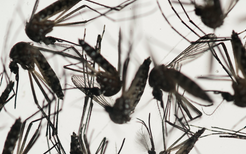GENEVA -- Acknowledging that Zika is "here to stay," the United Nations health agency on Friday ended its a 9-month-old emergency declaration over the spread of the Zika virus and began preparing for a longer-term response to the mosquito-borne virus that can result in severe neurological defects in newborns whose mothers are infected.
The World Health Organization's announcement dismayed some public health experts, who said countries are still wrestling with how to respond to epidemic.
However, U.N. officials noted that the move does not mean the agency is downgrading the threat posed by the virus, which has spread across Latin America, the Caribbean and elsewhere. Nearly 30 countries have reported birth defects linked to Zika, with 2,100 cases of nervous-system malformations reported in Brazil alone.
Recent outbreaks and related birth defects have also been detected in Southeast Asia although scientists believe that the virus has circulated there for decades.
Officials emphasized that the now-lifted public health emergency was declared in February, when Zika clusters were appearing and a sharp increase in research was needed -- and with the looming Rio Olympics in mind.
U.N. health officials said the emergency measures had led the world to an "urgent and coordinated response," but the virus had continued to spread. It acknowledged that "many aspects of this disease and associated consequences still remain to be understood, but this can best be done through sustained research."
"It is a significant and enduring public health challenge, but it no longer represents an emergency," Dr. David Heymann, who heads the World Health Organization's emergency committee on Zika, said after the panel met for the fifth time this year. "There was no downgrading of this."
Heymann said recommendations made in recent months were now being "internalized" at the Geneva-based agency.
"If anything, this has been escalated in importance by becoming activities that will be continued in the long term in the World Health Organization," he said.
Zika is mainly spread by mosquitoes but also can be spread through sex. Most infected people don't get sick. It can cause a mild illness, with fever, rash and joint pain.
It also causes microcephaly, or shrunken heads, in newborn children whose mothers were infected, leading to severe developmental problems and sowing grave concerns of would-be parents in countries hit by the virus.
Dr. Peter Salama, director of emergencies for the World Health Organization, said the new phase of fighting the virus requires development donors "to step up to the plate and see this for what it is, which is a long-term problem that the world will have to deal with for many years to come."
"We are sending the message that Zika is here to stay, and WHO's response is here to stay in a very robust manner," Salama said. Like other mosquito-borne diseases, Zika is seasonal and can be expected to return, Salama added, and countries now need to consider it an endemic disease and respond accordingly, with help from the WHO.
Responding to the U.N. announcement, the U.S. Centers for Disease Control reiterated its position that pregnant women should avoid traveling to areas with local transmission of Zika.
Dr. Anthony Fauci, director of the U.S. National Institute for Allergy and Infectious Diseases, which is funding many efforts to find a vaccine against Zika, suggested that it was premature for WHO to lift the state of emergency, since summer is just beginning in the Southern Hemisphere.
"Are we going to see a resurgence in Brazil, Colombia and elsewhere?" Fauci asked. "If they pull back on the emergency, they'd better be able to reinstate it. Why not wait a couple of months to see what happens?"
Fauci's agency will not slow down its efforts, he said, adding that the "decisions we make about developing a vaccine or not are unrelated to what the WHO says."
Information for this article was contributed by Jamey Keaten and Mike Stobbe of the Associated Press and Donald G. McNeil Jr. of the New York Times.
A Section on 11/19/2016

